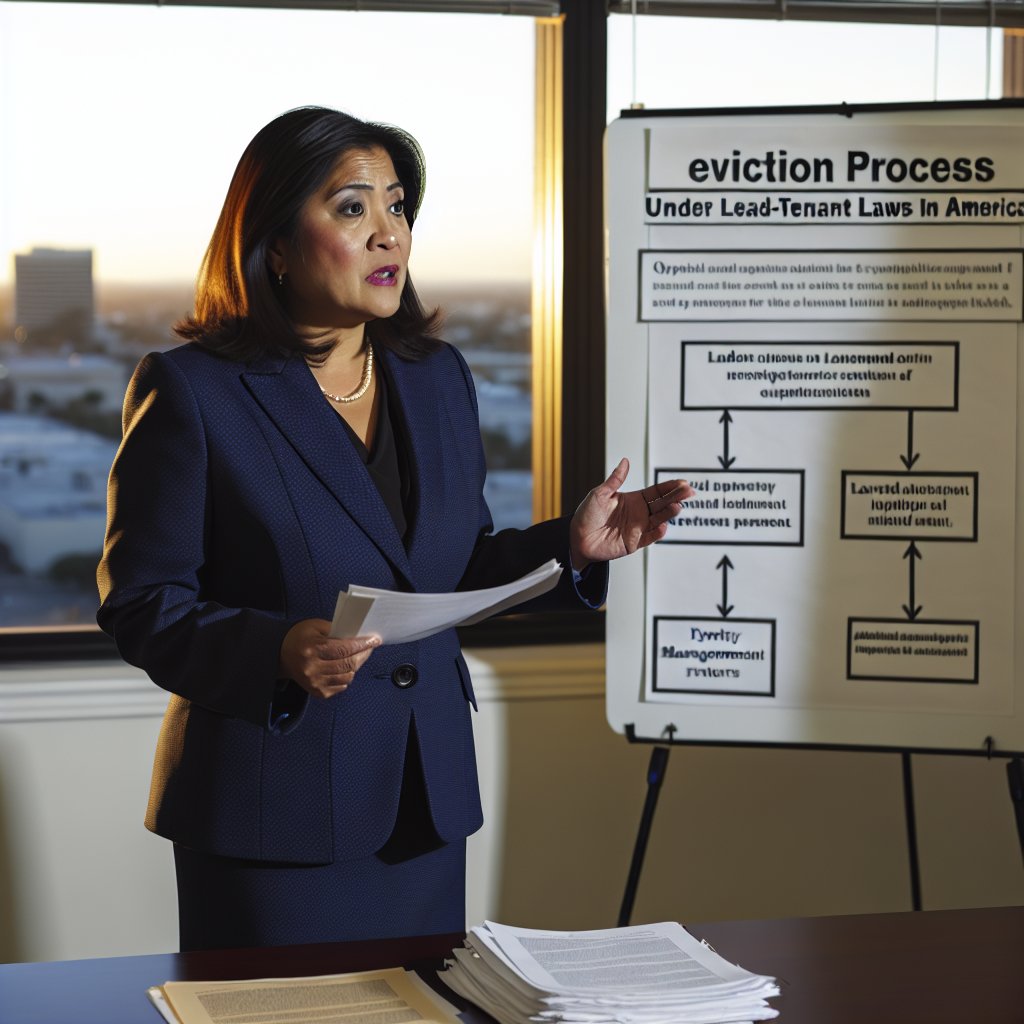Overview of Landlord-Tenant Law in the US
Landlord-tenant law governs the relationship between landlords and tenants.
This area of law varies significantly by state.
Generally, it protects tenants’ rights while also ensuring landlords can manage their properties.
Key elements include rental agreements, security deposits, and eviction processes.
Rental Agreements
A rental agreement outlines the terms between the landlord and tenant.
It includes rent amount, duration of the lease, and responsibilities for maintenance.
Both parties must adhere to the terms stated in the agreement.
Verbal agreements do exist, but written contracts are always recommended.
Security Deposits
Landlords typically require a security deposit at the beginning of the rental period.
This deposit protects landlords against potential damages or unpaid rent.
States differ on how much landlords can charge for security deposits.
Moreover, landlords must return deposits within a stipulated time after the lease ends.
Eviction Process
The eviction process begins when a landlord wants to remove a tenant from their property.
Common reasons for eviction include non-payment of rent and lease violations.
Landlords must follow legal processes to avoid wrongful eviction claims.
The initial step usually involves providing notice to the tenant.
Notice Requirements
Notice requirements vary by state and the nature of the eviction.
Some states require a written notice three to five days before initiating court action.
Other states might necessitate a longer notice period for specific causes.
Court Proceedings
If tenants do not rectify their behavior, landlords may file for eviction in court.
The court will schedule a hearing, and both parties can present their cases.
If the court rules in favor of the landlord, it will issue an eviction order.
Tenant Rights
Tenants have rights that protect them throughout this process.
They can challenge eviction notices if they believe they are unjust.
Additionally, tenants have the right to a safe and habitable living environment.
Grounds for Eviction: Legal Reasons a Landlord Can Use
Non-Payment of Rent
A landlord can initiate eviction for non-payment of rent.
This is one of the most common grounds for eviction.
Landlords must provide proper notice before filing.
The notice typically details the amount due and the payment deadline.
Lease Violations
Eviction may occur if a tenant violates lease terms.
Common violations include unauthorized pets or subletting.
A landlord must address the violation in writing.
This notice generally allows the tenant time to correct the issue.
Expiration of Lease
When a lease expires, a landlord may seek eviction.
Tenants must leave the property unless a new agreement is made.
Notification provides clarity about the lease expiration.
Illegal Activities
Engaging in illegal activities can lead to eviction.
Landlords must gather evidence of such activities.
Drug use or sales are common reasons for this ground.
Property Damage
Significant property damage by tenants warrants eviction.
Landlords can start the process for intentional destruction.
Proper documentation of damages is essential for legal proceedings.
Health or Safety Violations
If a tenant creates health or safety hazards, eviction is possible.
This includes excessive noise or unsanitary conditions.
Landlords must provide notice of the violations.
Owner Move-In
Landlords may evict tenants if they wish to occupy the unit.
This ground requires proper documentation and notification.
State laws often dictate specific notice periods.
Other Legal Grounds
Each state has additional legal grounds for eviction.
These may include failure to provide access for repairs.
Researching local laws ensures compliance and proper process.
The Notice Requirement
Importance of Notices
Notices play a crucial role in the eviction process.
They inform tenants about lease violations or non-payment of rent.
Proper notices ensure that landlords follow the legal process.
This protects both parties’ rights during eviction proceedings.
Types of Notices
There are several types of notices landlords may issue.
Each notice serves a specific purpose in the eviction process.
Pay or Quit Notice
A pay or quit notice addresses non-payment of rent.
This notice gives tenants a specific time to pay overdue rent.
If the tenant fails to pay, the landlord can proceed with eviction.
Notice to Cure
A notice to cure addresses lease violations.
The landlord must specify the violation in the notice.
Tenants typically have a chance to correct the issue.
Unconditional Quit Notice
This notice requires tenants to leave the property immediately.
It is often used for serious lease violations or repeated offenses.
Once served, tenants have no option to remedy the situation.
Delivery Methods
Landlords must deliver notices properly for them to be valid.
Common delivery methods include personal delivery and mail.
Some jurisdictions allow electronic delivery as well.
Failure to deliver a notice correctly can delay eviction proceedings.
Legal Compliance
Landlords must follow state and local laws regarding notices.
Each jurisdiction may have different rules to follow.
Failure to comply can result in dismissal of eviction cases.
Consulting a legal professional can ensure proper compliance.
Discover More: The Role of Property Taxes in Real Estate Transactions
Filing for Eviction: The Legal Process from Application to Court
Understanding the Eviction Process
Eviction is a legal process that landlords must follow to remove tenants.
Typically, it begins when a tenant violates a lease agreement.
Violations can include non-payment of rent or breach of lease terms.
Landlords should document all incidents to support their case.
Preparing the Eviction Notice
The first step is to prepare an eviction notice.
This notice informs the tenant of the intended eviction.
Landlords must adhere to specific notice requirements in their state.
For example, some states require a three-day notice for non-payment.
Others may allow a thirty-day notice for lease breaches.
Delivering the Eviction Notice
Once prepared, the landlord must deliver the eviction notice.
Methods of delivery include personal service or certified mail.
It’s crucial to keep records of how/when the notice was sent.
This documentation serves as proof if the case goes to court.
Filing the Eviction Lawsuit
If the tenant does not comply, the landlord can file a lawsuit.
This typically involves submitting paperwork to the local court.
Landlords must pay a filing fee at this stage.
Only after filing does the court schedule a hearing date.
The Court Hearing
During the hearing, both the landlord and tenant present evidence.
Landlords should bring all relevant documentation and witnesses.
The judge will review the case and make a ruling.
If the landlord wins, a judgment will be issued against the tenant.
Post-Judgment Actions
If a judgment favors the landlord, the eviction process continues.
Landlords must request a Writ of Possession from the court.
This document allows law enforcement to remove the tenant from the property.
Eviction usually occurs several days or weeks after the judgment.
Potential Challenges and Appeals
Tenants may challenge the eviction in court.
They can file an appeal, which delays the eviction process.
During this time, landlords cannot remove the tenant from the property.
Landlords should be aware of potential delays in this stage.
Delve into the Subject: A Tenant’s Guide To Withholding Rent Legally Under Landlord-Tenant Laws
Tenant Rights During the Eviction Process
Understanding Tenant Rights
Tenants have rights during the eviction process that protect them from unjust actions.
These rights vary by state, but common protections exist nationwide.
For example, tenants cannot be forcibly removed without a legal process.
Instead, landlords must follow specific procedures established by landlord-tenant laws.
Receiving Proper Notice
Landlords must provide tenants with a written notice before initiating an eviction.
This notice typically states the reason for eviction and gives a specific timeframe to respond.
It is critical for tenants to understand the type of notice received.
Notices generally fall into categories like pay rent or quit, cure or quit, and unconditional quit.
Right to a Court Hearing
Tenants have the right to a court hearing before eviction can occur.
This hearing enables tenants to present their side of the story.
During the hearing, tenants can argue against the landlord’s claims and evidence.
The court will make a fair decision based on the presented evidence.
Protection Against Retaliatory Eviction
Tenants are protected from retaliatory eviction practices.
Landlords cannot evict tenants for exercising their legal rights.
This includes reporting health or safety violations to authorities.
If a tenant believes their eviction is retaliatory, they can contest it in court.
Right to Legal Representation
Tenants have the right to seek legal representation during eviction proceedings.
Having an attorney can significantly impact the outcome of a case.
If a tenant cannot afford a lawyer, they may qualify for free or low-cost legal assistance.
Legal aid organizations often provide support for low-income individuals.
Moving Out and Withholding Rent
Tenants sometimes consider withholding rent during disputes.
However, this action can lead to eviction if not handled correctly.
Tenants should understand their rights regarding habitability before withholding rent.
In some cases, moving out may be a wise choice, depending on their situation.
Keeping Records
Tenants should keep detailed records throughout the eviction process.
This includes copies of communications with landlords and notices received.
Maintaining documentation can support a tenant’s case in court.
It’s essential to document any issues that led to the eviction as well.
Accessing Local Resources
Tenants can access local resources for additional support and guidance.
Many communities offer tenant advocacy groups or legal assistance programs.
These organizations can provide valuable information on tenant rights and eviction processes.
Additionally, local housing authorities may offer resources specific to their areas.
You Might Also Like: Understanding Foreclosure Laws And How They Protect Homeowners In The USA
Defenses Tenants Can Use Against Eviction
Understanding Legal Grounds for Defense
Tenants often have several legal grounds to challenge an eviction.
These defenses can help tenants remain in their homes.
It’s vital to know the applicable tenant rights.
Improper Notification
One common defense involves improper notice from the landlord.
Landlords must follow specific protocols when notifying tenants.
Failure to do so can invalidate the eviction process.
Retaliation Claims
Tenants can argue that eviction is a retaliatory action.
This occurs when landlords evict tenants for exercising their rights.
For instance, reporting health and safety violations can trigger retaliation.
Habitability Issues
Another effective defense relates to habitability standards.
Tenants can argue they cannot be evicted if the property is uninhabitable.
Common issues include plumbing problems, mold, or pest infestations.
Discrimination
Discriminatory practices can also serve as a defensive strategy.
Tenant protection laws prohibit eviction based on specific traits.
Examples include race, gender, familial status, and disability.
Failure to Maintain Lease Terms
Tenants may defend against eviction if landlords breach lease agreements.
For example, landlords must provide promised repairs and maintenance.
Failure to do so undermines their eviction efforts.
Payment Issues
Tenants can challenge eviction if they prove rent payments were made.
Documentation, like bank statements or receipts, is essential.
This proof can fully counter eviction claims due to unpaid rent.
Seeking Legal Assistance
Tenants should consider contacting legal aid organizations.
Legal professionals can offer tailored advice and representation.
Additionally, they can help navigate complicated landlord-tenant laws.
Preparing for Court
Preparation is key to successfully defending against eviction.
Tenants should gather all relevant documents and evidence.
Additionally, researching local housing laws can strengthen their case.
See Related Content: Legal Requirements For Tenant Notices And Communication With Landlords

Court Proceedings: What to Expect in an Eviction Hearing
Preparing for the Hearing
Arrive early to familiarize yourself with the courtroom layout.
Gather all necessary documents beforehand.
Consider bringing a witness to support your case.
Organize your evidence clearly and logically.
Dress respectfully to make a good impression.
The Hearing Process
Once the hearing begins, the judge will introduce the case.
Both parties will present their arguments.
Typically, the landlord goes first, explaining the reasons for eviction.
Following that, the tenant has the opportunity to respond.
Witnesses may be called to provide additional testimonies.
Presenting Evidence
Prepare and submit any relevant documents to the court.
Evidence may include rental agreements and communication records.
Ensure that all evidence supports your claims convincingly.
Be ready to answer questions regarding your evidence.
Understanding the Judge’s Decision
After hearing both sides, the judge will make a decision.
The ruling may occur on the same day or be issued later.
If you disagree with the decision, consider your options for appeal.
Keep in mind that an eviction order must be properly executed.
Post-Hearing Actions
After the ruling, follow any instructions provided by the court.
If you’re granted more time, adhere to the deadline given.
Maintain open communication with your landlord whenever possible.
Document any interactions related to the eviction process.
Seek legal advice if you have further questions or need assistance.
Post-Eviction Procedures: Ensuring Compliance and Recovery
Understanding the Eviction Process
The eviction process requires careful adherence to legal standards.
Landlords must follow specific procedures to avoid legal complications.
Understanding these steps helps both parties navigate the situation.
Ensuring Compliance with Court Orders
Once the eviction is finalized, landlords should ensure compliance.
They must follow court orders regarding removal and property recovery.
Failure to comply can result in legal repercussions for the landlord.
Recovering Possession of the Property
After eviction, landlords need to recover possession of the property.
This often involves changing locks or addressing any remaining tenant belongings.
Documentation of this process protects landlords from future disputes.
Dealing with Tenant’s Property
Landlords might encounter abandoned property during the eviction process.
They must follow state laws regarding the storage or disposal of belongings.
Failing to do so can lead to claims for damages by the former tenant.
Considering Tenant’s Right to Appeal
Former tenants may have the right to appeal the eviction decision.
Landlords should stay informed of any appeals filed by tenants.
Handling appeals carefully can reduce potential delays in regaining property.
Financial Considerations and Recovery
Landlords may lose rent during the eviction process.
They should assess any financial losses incurred during this time.
Exploring collections or small claims court can help recover owed amounts.
Legal Documentation and Record Keeping
Maintaining accurate records is crucial during and after eviction.
Landlords should document every step of the process meticulously.
This documentation serves as evidence in case of disputes or claims.
State-Specific Variations in Eviction Laws and Processes
Understanding Local Regulations
Landlord-tenant laws vary significantly from state to state.
Each state defines its own eviction processes and tenant rights.
Landlords must comply with their state’s specific regulations.
Failure to follow these laws can lead to legal complications.
Common Grounds for Eviction
All states allow eviction for nonpayment of rent.
Most states recognize lease violations as a valid reason for eviction.
Illegal activities on the premises can also prompt eviction actions.
Additionally, some states allow evictions for lease expiration without renewal.
Notice Requirements
Each state mandates a specific notice period before eviction.
For instance, California requires a three-day notice for nonpayment of rent.
Other states may differ, often ranging from three to thirty days.
Landlords must provide proper written notice to tenants before legally proceeding.
Court Proceedings
If tenants do not comply with the notice, landlords can file an eviction lawsuit.
The process typically involves a court hearing where both parties present evidence.
Tenants can defend themselves against eviction in court.
Outcomes may vary depending on state laws and the specific circumstances involved.
Post-Eviction Process
After a successful eviction judgment, landlords can seek enforcement.
This typically involves a local sheriff who will remove the tenant from the property.
Tenants may have the option to appeal the court’s decision, depending on state law.
Moving forward, landlords must prepare for potential challenges during this process.
State Resources and Support
Tenants should familiarize themselves with their rights under local laws.
Many states offer resources, including legal aid organizations and tenant unions.
Additionally, state-specific websites provide valuable information on eviction laws.
Utilizing these resources can help both landlords and tenants navigate the eviction process.




